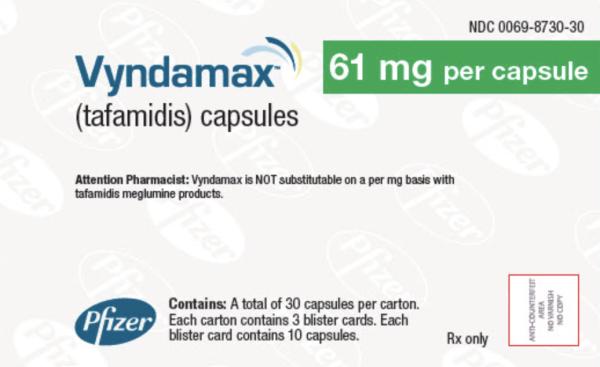Tafamidis
Generic name: tafamidis [ ta-FAM-id-is ]
Brand names: Vyndamax, Vyndaqel
Dosage form: oral capsule (61 mg; meglumine 20 mg)
Drug class: Transthyretin stabilizers
What is tafamidis?
Tafamidis affects a protein called transthyretin (TTR, made primarily in the liver). Transthyretin-mediated amyloidosis (ATTR) is a condition in which abnormal deposits of TTR protein build-up in many parts of the body, interfering with normal function. A build-up of TTR in the heart can lead to heart failure.
People with hereditary ATTR amyloidosis have a DNA mutation that can be passed from one generation to the next. People with wild-type ATTR amyloidosis do not have abnormal DNA and cannot pass on the condition.
Tafamidis is used in adults with hereditary or wild type ATTR to treat cardiomyopathy (damage of the heart muscle) caused by a build-up of TTR.
Tafamidis may also be used for purposes not listed in this medication guide.
Tafamidis side effects
Get emergency medical help if you have signs of an allergic reaction: hives; difficult breathing; swelling of your face, lips, tongue, or throat.
Less serious side effects may be more likely, and you may have none at all.
This is not a complete list of side effects and others may occur. Call your doctor for medical advice about side effects. You may report side effects to FDA at 1-800-FDA-1088.
Related/similar drugs
Vyndamax, eplontersen, Wainua, Amvuttra, Vyndaqel, Onpattro, Tegsedi
Warnings
Follow all directions on your medicine label and package. Tell each of your healthcare providers about all your medical conditions, allergies, and all medicines you use.
Before taking this medicine
Tell your doctor if you have ever had:
Your name may be listed on a Transthyretin Amyloidosis Outcome Survey registry to track the effects of tafamidis on your condition.
Tafamidis may harm an unborn baby. Use effective birth control to prevent pregnancy, and tell your doctor if you become pregnant.
If you become pregnant, tell your doctor or contact the manufacturer of tafamidis at 1-800-438-1985.
You should not breastfeed while using tafamidis.
How should I take tafamidis?
Follow all directions on your prescription label and read all medication guides or instruction sheets. Use the medicine exactly as directed.
Vyndaqel and Vyndamax are not equivalent medicines and may not have the same dosing schedule.
Take either Vyndaqel or Vyndamax exactly as your doctor has recommended. Avoid medication errors by using only the form and strength your doctor prescribes.
Swallow the capsule whole and do not crush, chew, break, or open it.
You may take tafamidis with or without food.
Store at room temperature away from moisture and heat. Keep each capsule in the blister pack until you are ready to take a dose.
Tafamidis dosing information
Usual Adult Dose for Amyloidogenic Transthyretin Amyloidosis:
Tafamidis meglumine (Vyndaqel): 80 mg orally once a day (Four 20 mg capsules/day)
OR
Tafamidis (Vyndamax): 61 mg orally once a day (One 61 mg capsule/day)
Comments:
-Tafamidis and tafamidis meglumine products are not substitutable on a per mg basis.
Use: For the treatment of the cardiomyopathy of wild-type or hereditary transthyretin-mediated amyloidosis (ATTR-CM) in adults to reduce cardiovascular mortality and cardiovascular-related hospitalization.
What happens if I miss a dose?
Take the medicine as soon as you can, but skip the missed dose if it is almost time for your next dose. Do not take two doses at one time.
What happens if I overdose?
Seek emergency medical attention or call the Poison Help line at 1-800-222-1222.
What should I avoid while taking tafamidis?
Follow your doctor's instructions about any restrictions on food, beverages, or activity.
What other drugs will affect tafamidis?
Other drugs may affect tafamidis, including prescription and over-the-counter medicines, vitamins, and herbal products. Tell your doctor about all your current medicines and any medicine you start or stop using.
Popular FAQ
Vyndamax, when compared to a placebo, was shown to improve the survival rates (71% vs. 57%, respectively) for patients with wild-type or hereditary transthyretin-mediated amyloidosis (ATTR-CM) over a 30-month long clinical study. Quality-of-life measurements improved as early as 6 months. Continue reading
It takes at least 6 months for Vyndaqel to start working and it may take up to 18 months for the full effects to be seen, but these persist for at least 30 months. There was significantly less decline in functional capacity (as measured by a 6-minute walk test [6MWT]) and health status (as measured by the Kansas City Cardiomyopathy Questionnaire-Overall Summary [KCCQ-OS]) with Vyndaqel at 6 months than placebo. It may take at least 18 months before Vyndaqel makes a difference in all cause mortality compared to placebo, but this difference persists and trials have reported a survival rate of 71% in those taking Vyndaqel compared to 57% taking placebo. Those receiving Vyndaqel had 32% less hospitalizations due to heart problems, also statistically significant. Continue reading
More about tafamidis
- Check interactions
- Compare alternatives
- Reviews (4)
- Side effects
- Dosage information
- During pregnancy
- Drug class: transthyretin stabilizers
- En español
Patient resources
Other brands
Professional resources
Other brands
Related treatment guides
Further information
Remember, keep this and all other medicines out of the reach of children, never share your medicines with others, and use this medication only for the indication prescribed.
Always consult your healthcare provider to ensure the information displayed on this page applies to your personal circumstances.
Copyright 1996-2024 Cerner Multum, Inc. Version: 1.01.

